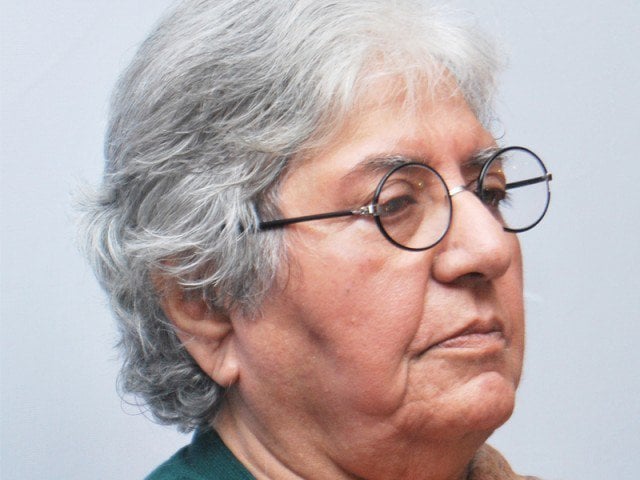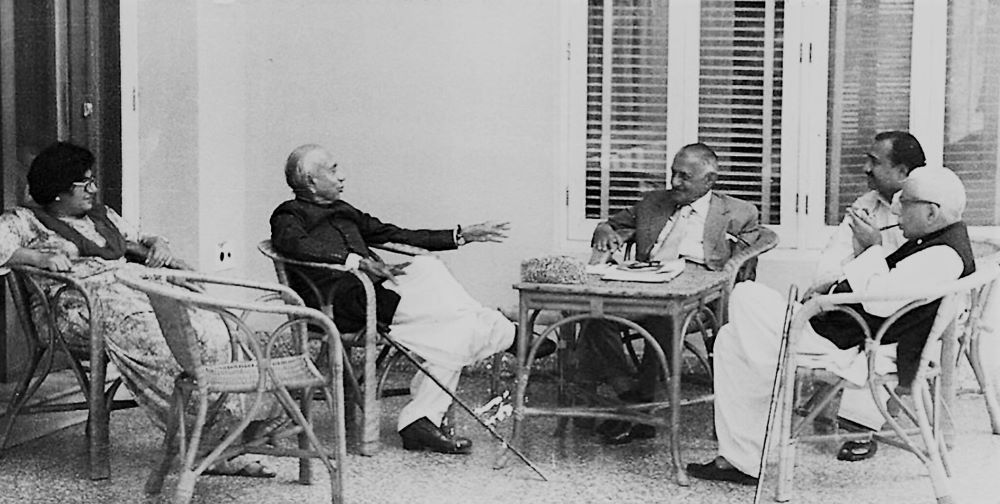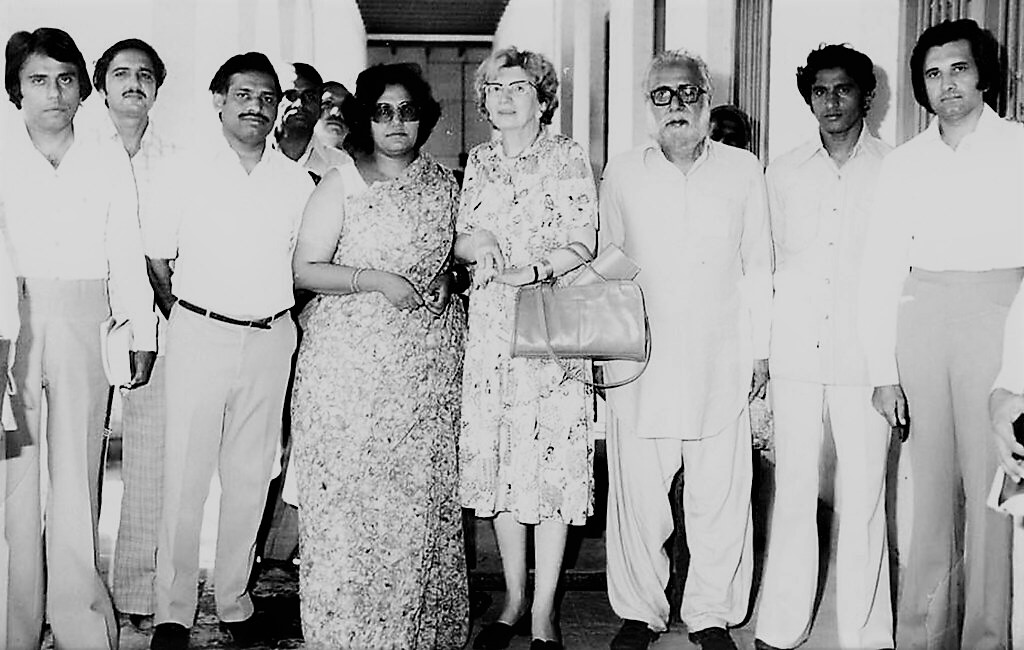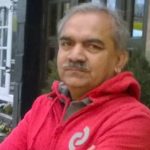
[Translator’s note: This is a translation of renowned historian Dr. Hamida Khuhro’s comprehensive interview, originally published in the Sindhi magazine Nao Niapo, Karachi in May, 1986. The interview panel consisted of Advocate Masood Noorani, Journalist Nasir Aijaz and Faqir Muhammad Lashari, with Mansoor Qadir Junjo’s assistance to the interviewers. Masood Noonari also contributed observation notes from his initial meeting with Dr. Khuhro, which were used as a preamble to the interview. The interview was later included in an anthology that contained interviews of Dr. Khuhro, published in various Sindhi language newspapers and magazines.
In 2021, Dr. Hamida Khuhro Foundation, Sindh (Karachi-Hyderabad) published Nao Napo magazine’s interview as a separate booklet with a title of ‘Tareekh Ji Amhon Samhon’ (Face-to-Face with History). The booklet includes a preface by Mansoor Qadir Junejo. This is the first part of the English translation of her interview. The subsequent parts will also be published in Sindh Courier – Zaffar Junejo]
We, Nasir Aijaz, photographer Saeed, and I, arrived at the Khuhro House. Mansoor Qadir Junejo, the political secretary of Dr. Hamida Khuhro, warmly welcomed us and escorted us to an adjacent room. Shortly after, cold drinks were served, and Mansoor Qadir Junejo assisted me in setting up the connections of the tape recorder. Soon, Faqir Muhammad Lashari also joined us. As I scanned the room, I noticed a pink-colored desk, and adjacent to it a pile of newspaper files was neatly arranged. In one corner of the room, a window air conditioner was installed. Other things related to education, confirmed my assumption that the room belonged to a student. Driven by my curiosity, I approached Mansoor Qadir Junejo to inquire about the belonging of the room. In response, Mr. Junejo informed me that Madam Khuhro’s daughter occasionally uses the room for studying. After making the necessary arrangements, Mansoor Qadir Junejo went to call Dr. Hamida Khuhro. When she arrived, her appearance remained consistent with the previous meeting—a simple lawn outfit, casual two-striped slippers, and no makeup. There was no display of assertiveness, arrogance, or exhibitionism; instead, there was a display of a genuine sense of humility character and down-to-earth posture. It seemed evident to me that deep engagement in study or involvement in struggle can shape an individual’s personality in such a fashion. At least, I could affirm that her personality truly reflected my assumptions.

The interview lasted approximately three hours and forty-five minutes. During the interview, a delicious lunch and tea were served. Dr. Haleem Qazi also joined us at lunch. He appeared to be a politically inclined person. During the interview, some off-the-record information was also shared and discussed.
She has a deep understanding of Marxism, more so than the men and women of Sindh’s feudal class.
Dr. Hamida Khuhro responded to our questions with patience, a sense of responsibility, and honesty. I highly appreciate her attitude. From her interview, I gathered that she is currently the most knowledgeable and politically conscious woman in Sindh. Let me say that she is second to none when it comes to political diplomacy, political understanding, and leadership, even her stature could be compared to world-class leaders. Undoubtedly, she has command over the subject of history, but she also has a considerable grasp over other related subjects. She possesses a vast ocean of information and experiences. She has a deep understanding of Marxism, more so than the men and women of Sindh’s feudal class. However, she roughly classifies society, dividing it into ‘urban Sindh’ as bourgeoisie and ‘rural Sindh’ as proletariat. She realizes that the Sindhi masses despise landlords, but at the same time, she is concerned about Sindh’s salvation. In our conversation, she sadly stated, ‘First be liberated, and afterwards, if you hate and dislike landlords, then go ahead to pick and kill them.’ Additionally, she understands that Sindh’s youth and intellectuals, along with liberation, also aspire for socialism. Perhaps due to this realization, she reminds us that one should first be liberated and then decide about the preferred system. Although it is a diplomatic stance, but it conveys that our upper class recognizes the importance of socialism.
She stated, ‘First be liberated, and afterwards, if you hate and dislike landlords, then go ahead to pick and kill them.’
Coincidently, one could think or even ask, ‘If Dr. Khuhro is such a wise lady, why is she far away from any responsible position?’ There may be many responses to that question, but upon retrospectively reviewing, I see that Sindh has produced two types of people: the first group can be called people of true genius and daring, while the other group can be labeled as people of low capacities and diminutive character. The people or group with intermediate capacities, who could play the role of a bridge for connecting both groups has been missed. Let me elaborate more that individuals such as G. M. Syed, Mumtaz Bhutto, Rasool Bux Palijo, Jam Saqi, Ibrahim Joyo, Shaikh Ayaz, Dr. Hamida Khuhro, and Syed Ghulam Mustafa Shah have all suffered due to this reality or prevailing situation. Perhaps their thoughts and political acumen were too advanced for their times and contemporaries. The number of people who could understand their thoughts is minimal. Therefore, their message and ideology couldn’t reach the maximum number of people. Perhaps we lack teamwork and coordination, which has resulted in our failure to achieve sustained accomplishments.
Dr. Hamida Khuhro had declared that her first task would be to establish order and discipline within the organization i.e. Jeay Sindh Tahreek

It is a tragedy for Dr. Hamida Khuhro that she was born into a family that was a key partner of the government that imposed the One-Unit. Therefore, people in Sindh remain doubtful about her political commitment. Perhaps, her current association with G.M. Syed is an attempt to dispel that impression – None knows or confirms it. However, she differs greatly from G.M. Syed’s ideology and prefers tangible actions. In realizing her plans, her priority has become organizing the Jeay Sindh Tahreek. Therefore, she declared that her first task would be to establish order and discipline within the organization, extend its outreach, and establish units in every village. Apparently, her statement holds true, as G.M. Syed never gave due importance to organization and discipline.
The conversation with Dr. Hamida Khuhro has convinced me to state that it shouldn’t be a principle to hold children responsible for the deeds of their parents. Sometimes, I wonder what keeps her away to announce her own political party. Perhaps there is a shortage of financial resources or other reasons. Honestly, I don’t know. But present state of affairs is evidence that due to one excuse or another, none of us is free to serve the motherland.
Dr. Hamida Khuhro’s dialect and style were of Northern Sindh, but surprisingly, it considerably resembled that of Southern Sindh. Another amusing aspect for me was that in such a long conversation, being a woman, she never once uttered Sindhi words like ‘Muo Mario’ or “’Aie Alla,’ as, generally, these descriptive Sindhi words are used by Sindhi women along with facial and hand gestures in specific contexts to express themselves. Furthermore, I must reiterate that she is a unique woman! Masood Noorani, 21st May, 1986 (3:56 a.m.)
[Preface to the interview ends – Interview to follow]
Click here for Part-I
_____________
About the translator
 Dr. Zaffar Junejo is a historian and a writer, having earned Doctorate from the Department of History University of Malaya, Malaysia. Presently, Mr. Junejo is associated with the European University Institute, Florence, Italy. Apart from scholarly contribution, he also writes for popular media. He could be accessed at: Email junejozi@gmail.com, Cell/WhatsApp +92 334 045 5333 Skype Zaffar.Junejo Facebook facebook.com/zaffar.junejo
Dr. Zaffar Junejo is a historian and a writer, having earned Doctorate from the Department of History University of Malaya, Malaysia. Presently, Mr. Junejo is associated with the European University Institute, Florence, Italy. Apart from scholarly contribution, he also writes for popular media. He could be accessed at: Email junejozi@gmail.com, Cell/WhatsApp +92 334 045 5333 Skype Zaffar.Junejo Facebook facebook.com/zaffar.junejo